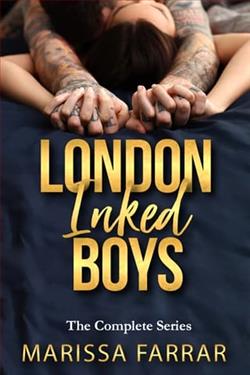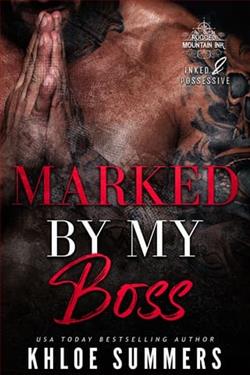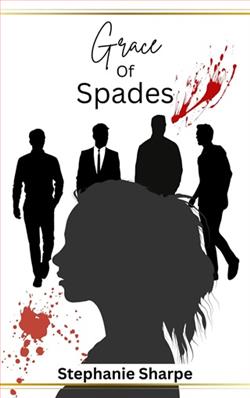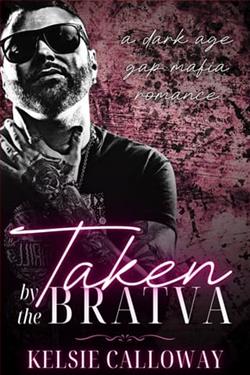Page 27 of Thick and Thin
“Let’s not go down that path,” my father said, and I completely understood his point of view. He was likely thinking everything I had initially—but, having kept him informed over the last few months, he also knew Sinclair had treated me well. “But there are a few things I would like to talk about.”
Dread gripped my stomach, causing the smell of soy sauce and ginger to sour in my nostrils. What was my father going to say?
Sinclair, however, seemed curious. “I’m all ears.”
“How old were you when your old man pulled his mining operation out of Winchester?”
The breath flew from my lungs. Dad was going for the jugular, not even warming up the prey before striking. I wasn’t sure when I would take a bite of food, but I knew it wouldn’t be now.
But Sinclair’s face was neutral and, if I’d had to guess at the moment, I would have said he was unfazed. “I don’t know. I wasn’t privy to much of my father’s business affairs until I was older. I do remember him saying something about Winchester being a PR nightmare.”
My father nodded, swallowing a bite of chicken. “This is hitting the spot, by the way. Just what the doctor ordered. Thank you.”
Sinclair’s smile came easily. “Glad to hear it.”
It wasn’t until that moment that I realized how good my dad was with people—and, in his line of work before growing sick, I knew he must have always been. He’d worked for Human Services, helping people in their greatest hour of need. Whether his talent for making someone comfortable had either been a skill he’d been born with or developed on the job, it continued to serve him well.
And it was probably why people turned on him later, feeling betrayed.
He said, “Annalise was a baby when I noticed the first gash on the hill just in front of Winchester Peak. I didn’t think much about it at first, but the hill came into full view every day as I’d pull my car into the parking lot at work. And, over time, it got worse and worse. It began to look like the whole hill was going to crumble to the ground. For several months, I just talked to people at work about it. Eventually, I learned that the Whittiers—your family—owned much of that land and that you—or they—had been mining and had been for quite some time. I didn’t know it then, but there had been even more aggressive mining out of sight, behind that hill.”
Sinclair said, “So you’re saying that the damage you can see in town isn’t all of it?”
“Right. Well, I’ve always been a curious fellow, and I began doing some research. Nobody in town with answers would talk to me about it—not the county commissioners, not city council. So I had to do it on my own. Unfortunately, I couldn’t find a thing about any agreements made between the local government and your father, but the way people were so tight-lipped told me something had happened. But I kept researching—and I discovered just how destructive that mine was and could become. Do you know anything about the environmental hazards of strip mining?”
Sinclair took a drink of water from his glass. “I don’t know details but I’ve heard that it’s bad for the environment.”
“It is. Besides destroying the natural beauty of our town, it causes erosion problems. You can see that now, because the land was stripped of all its vegetation and never replanted. Deforestation, of course, is another big concern, and, even now, hardly anything can grow there because when it rains, it washes so much of the soil away. It also disturbs the habitat for animals and, in many cases, can lead to water pollution. Fortunately, this particular mine hadn’t gotten far enough to do that.”
I’d heard much of this before but in greater detail, and I’d forgotten about a specific incident until just now. Several months before my mother left, my parents and I had gone to dinner at their friends’ house, a family in Winchester they were close to. After we’d eaten dinner, the parents played Trivial Pursuit and had me and their two children go to the basement filled with toys and kids’ games. The son, a few years older, was playing a video game, but the daughter and I, close in age, were playing dress up. Suddenly, my mother had appeared, telling me to take off the Halloween princess costume I was wearing and to come upstairs because we were leaving.
I’d been upset because the girl and I had been enjoying ourselves and we’d barely started playing. I’d already begun experiencing the loneliness of being ostracized at school, but it hadn’t gotten into full swing yet. When I came upstairs, I could tell something was wrong but didn’t understand—and it wasn’t until we were in the car that my mother began scolding my father about ruining a perfectly good evening.
But one thing I remembered my father saying—not the words but the gist—was that it was clear that the man of the family was “in the Whittiers’s back pocket.” It was something I’d heard over and over as the years went by, that people in town, especially politicians, turned a blind eye to what was happening because they’d been bought off.
My father said, “Do you have children, Sinclair?”
“I don’t.”
“When you bring a child into this world, your whole perspective changes. At least it did for me. You stop living for the moment and start looking at the impact your decisions will have on your child—and I couldn’t stop thinking about how awful a place Winchester would be if I just sat back and let it happen.”
Sinclair nodded, obviously tuned into my father—and that simply spurred my dad on. It wasn’t until that moment that I realized just how lively he was, as if talking about the past had energized him. Ever since the infusion he’d been fatigued and pale, but now his cheeks had some color—and his energy level was better than it had been since I’d returned.
He was passionate about this subject, I knew—but he hadn’t had an audience in a long time.
“I wrote your father a letter, asking if we could meet. When I didn’t hear back after a month, I wrote another letter, basically outlining all the reasons why the mine was so detrimental.” My dad chuckled. “It was long, three pages, but I hoped it would make an impression. I ended by offering a compromise: keep the mine but change the manner of mining. Don’t get me wrong—there are problems with underground mines too but I understand their importance to our way of living. And underground mines are far better for the environment.”
I was merely an observer as this conversation unfolded—but I remained amazed at my father’s eloquence. As much as I’d loved and adored this man before, he was becoming an even bigger hero in my mind as I watched him in his element.
Sinclair said, “We have mines elsewhere. My older brother came home from school one time and went on and on about how the different minerals our company extracted from our mines made the world a better place.”
“I’m no fool. I understand why we mine, but there’s a better way.”
“If it makes you feel any better, my brother was just trying to impress my father. Warren—our middle brother—even called him an ass kisser in the middle of dinner and was told to leave.”
My father chuckled, and it felt like a muscle relaxer. They were having a civil conversation—and Sinclair seemed to be genuinely interested. Dad said, “Your father replied—but it was nothing more than a dismissal as well as the assurance that he would continue mining. I tried to set up a meeting and was told by everyone at the company that I spoke with that he didn’t have time.
“I knew I was being blown off—so I decided to try another tack. I again tried to work with local government officials, but they’d have none of it. Bear in mind that I’m covering a span of years here—I really was trying to work with your father or even the local government. Frustrated with the lack of results, I organized a fundraiser to raise awareness about the environmental hazards of the mine, and I used the money I earned to make flyers to generate interest in a meeting at the library. Not many people came, but they seemed curious. So then I organized protests. At first, I had a few people marching with me and even managed to get news crews from Colorado Springs to report on what we were doing…and that’s when everything changed.















